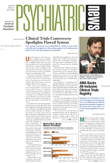Are major depressive disorder and bipolar disorder related? There are various reasons to think so. For instance, bipolar disorder is sometimes misdiagnosed as recurrent major depressive disorder. Bipolar disorder and severe major depression are also known to aggregate in families, and this overlap appears to be due to genetic factors.
And now still more reason to believe that major depression and bipolar disorder are related comes from a study conducted by Italian and American psychiatric researchers. It found that subjects with recurrent major depression experienced a substantial number of manic/hypomanic symptoms over their lifetimes.
The principal author of the study is Giovanni Cassano, M.D., director of the department of psychiatry, neurobiology, pharmacology, and biotechnology at the University of Pisa. Results of the study appeared in the July American Journal of Psychiatry.
Recruited to participate in the study were 117 patients with remitted recurrent major depression and 106 patients with bipolar I disorder. Patients in both groups included inpatients and outpatients from nine academic settings in Italy.
The investigators confirmed all of the subjects' diagnoses with the Mini International Neuropsychiatric Interview, a brief structured interview designed to diagnose Axis I disorders and antisocial personality disorder according to DSM-IV and ICD-10 criteria. The reliability of this instrument has proven to be excellent in multicenter clinical trials and in epidemiological and clinical studies.
The subjects were also given the Structured Clinical Interview for the Spectrum of Mood Disorders. It was developed by Italian and American psychiatrists, including several of the authors of this study, to assess subjects' lifetime symptoms, traits, and lifestyles that characterize threshold and subthreshold mood episodes as well as temperamental features related to mood dysregulation.
Traditional Dichotomy Challenged
First, the subjects with recurrent major depression reported that they had experienced a substantial number of manic or hypomanic symptoms over their lifetimes.
“The presence of a significant number of manic/hypomanic items in patients with recurrent major depression seems to challenge the traditional dichotomy of unipolar-bipolar disorder and bridges the gap between these two categories of mood disorders,” the researchers stated in their study report.
Second, in both patients with recurrent major depression and patients with bipolar I disorder, the number of manic/hypomanic items reported was related to the number of depressive items reported, suggesting a link between the two.
And finally, the more manic/hypomanic items that the recurrent major depression subjects reported, the greater the likelihood that they also reported having suicidal ideas or paranoid or delusional thoughts, such as“ feeling as if others were causing all of your problems,”“ feeling surrounded by hostility,” or “everyone is talking about you,” at some point in their lives.
“This latter result,” the researchers wrote,“ corroborates the observation that the presence of even mild manic symptoms may change a depressive presentation into a mixed presentation and increase the likelihood of psychotic symptoms.”
These results imply, said the researchers, that major depression and bipolar disorder are related and that the psychiatric field “would benefit from a unitary and continuous approach to the assessment of both manic/hypomanic and depressive symptoms.”
Or as Cassano told Psychiatric News, the results “provide evidence that a substantial proportion of patients with unipolar depression experience manic/hypomanic symptoms during their lifetime and that these symptoms are associated with a more negative prognosis (suicidality, paranoid ideation). Because this association is similar to the one found in bipolar patients, we conclude that unipolar and bipolar disorders are not two discrete entities, but should be considered a unitary phenomenon, to be studied using a longitudinal perspective.”
Poorer Prognosis Expected
When asked about the clinical implications of the results, Cassano said,“ The assessment of manic-hypomanic symptoms in so-called unipolar patients is probably important in predicting a poorer prognosis. A large clinical trial is under way in Pittsburgh and Pisa to determine whether manic/hypomanic symptoms in unipolar patients characterize a distinct phenotype showing a differential response to treatment with SSRI, interpersonal therapy, or a combination of the two.”
David Kupfer, M.D., chair of psychiatry at the University of Pittsburgh and one of the study authors, told Psychiatric News, “The implications of this research for clinical psychiatrists are important since many difficult-to-treat patients are difficult because they have a `dose' of unipolar and bipolar features. While they are often diagnosed with non-bipolar depression, there is a significant degree of subsyndromal lifetime bipolar features that reduce the usual level of therapeutic responsiveness that can be expected with SSRI or other interventions used to treat depression. This may also be true in those individuals who do not respond to targeted psychotherapy alone (interpersonal therapy or cognitive behavioral therapy). Many of these individuals may require treatment sequencing or combination treatments to achieve full recovery.”
Am J Psychiatry 2004 161 1264
